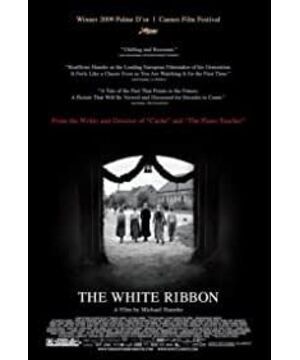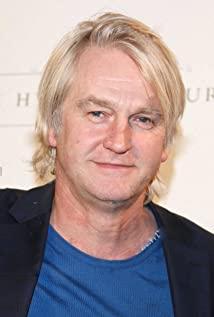It should be said that the film was quite successful. The black and white colors emphasized the gloomy and depressive atmosphere of the whole film. The doctor’s accident at the beginning of the film attracted the audience to the plot; the suspense that followed pushed the story forward. Development; when the layers of fog are uncovered and the logic returns to clarity, the film stops abruptly, and everything falls into the fog. An ordinary German village is perilous; a group of ordinary people are entangled with grievances; a group of innocent teenagers are struggling in the whirlpool of good and evil. Behind the deep eyes are hidden secrets, and in the dark houses, there are also sinful souls lurking. The audience is like the teacher in the film, an outsider, looking at the small village, deepening into the texture of the small village layer by layer, and understanding the intricate interrelationships of the village. In fact, these relationships are all well known to the villagers. of. The effect of this kind of separation makes us wait for the teacher's slow narration to understand the plot, and listen to the director's peeling cocoon to slowly unfold the enclosed village in front of you.
This is a small village in Germany, a village before the First World War, calm and suppressed, but crime is everywhere. Such villages exist all over the world. As long as the conditions are right, the good and evil in human nature will ferment, and their respective flowers will grow, either brilliantly, or smelly. "White Ribbon" is an excellent portrayal of the human nature of the villagers in this small village. The human nature lurking in people's hearts dominates the life of this village. Human nature, only human nature, makes this village full of blood and rain, and the white ribbon symbolizing religious purity cannot be restrained, and even family affection is indulged in this unfathomable human quagmire.
After watching this film, I looked through some comments. Many regarded this film as the basis of public opinion for exploring the origin of the Nazis. I think there is an over-interpretation. I don't know if the director has this intention, but at least it is impossible to draw such a conclusion in the film. When we evaluate movies, we can only start from what is given in the movie, and we should not make excessive associations. If a movie cannot explain the problem in the movie, but I have to tell you outside the movie, will such a movie be a good movie? Going back to this film, some people think that the film describes the German people who supported the Nazis during the rise of the Nazis. In the film, these people are teenagers who have grown up under the repression of patriarchy, and are depressed and dull. Growing up in the countryside, the restrictions imposed by religion on them have become a mere formality. The complex relationship between people makes them admire violence to solve all problems. Their respect for patriarchy also makes them accustomed to worshiping leaders and heads of state. In fact, history cannot be reversed. The flower of evil can be deduced from the fruit of evil, and there is more than one factor that affects history. The interaction of many factors is the cause of history. In Europe, there are countless villages like this calm, suppressed and full of evil, and some are even worse. Why is the foundation of Nazi public opinion not produced in those countries in those societies? The respect for patriarchy seems to be stronger in the East, but Hitler still only appears in Germany. If history can be viewed in such a simple way, the villages in Germany at the beginning of the last century led to the emergence of the Nazis in the 1920s and 1930s, then we would like to ask, what kind of atmosphere in the small Russian villages caused Sovietism in Soviet Russia? Sometimes arbitrarily deduced, may draw absurd conclusions.
View more about The White Ribbon reviews









